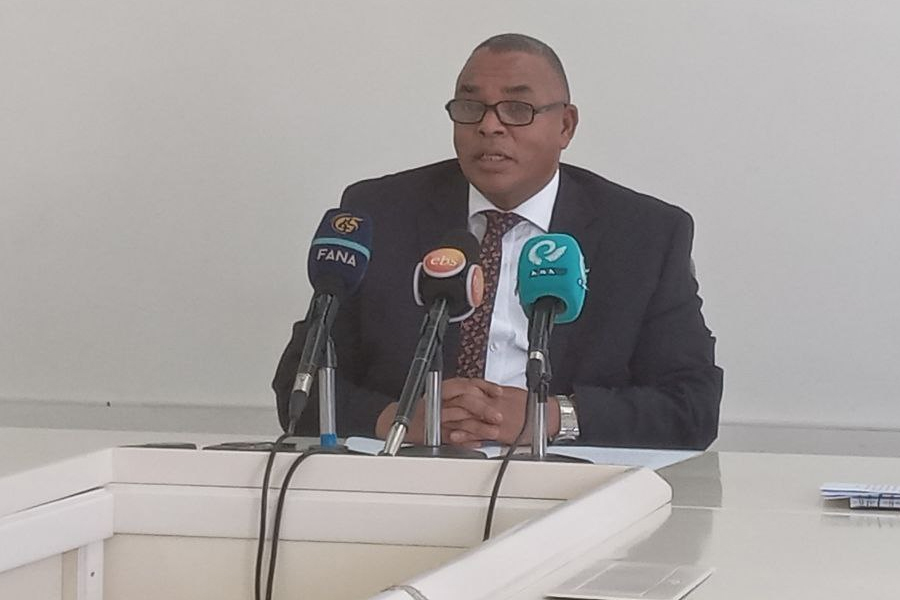
Dec 2 , 2023
By AKSAH ITALO ( FORTUNE STAFF WRITER )
Amidst accession to a cross-regional trade, one of the oldest industries is struggling with policy fragmentation and loose value chains. With 18 operational tanneries, 21 footwear and 25 leather product manufacturers, subpar products have plagued the Ethiopian leather industry with export earnings dropping threefold over the past five years.
Leather and its finished products accounted for only one percent of total merchandise export teetering with a mere 32 million dollar revenues. The number shows a stark contrast from 2017, which stood at 141 million dollars.
The findings were presented by representatives from the Ethiopian Leather Association a fortnight ago, where they converged at the Hilton Hotel to discuss the fate of their industry. Lively discussions on sound policy-making before participating in the African Continental Free Trade Area (AfCFTA) were hailed by participants.
Project Coordinator of the Association, Endale Seifu observes that limited access to chemicals compounded by foreign currency shortages, and a lack of prioritisation from policymakers are pushing several plants to perform below capacity.
Ethiopia has the continent’s largest livestock population, with over 170 million cattle, sheep and goats. The annual livestock output includes approximately 2.7 million cattle hides, 8.1 million sheepskins, and 7.5 million goatskins. However, the sector’s potential remains untapped, with nearly 60pc of the production costs arising from the hides’ price.
Endale urged authorities to create an enabling policy environment that fosters strong industry linkages and prioritises access to foreign currency.
"It's bound to dwindle further in the absence of an action," he said.
Endale indicated that the failure in compliance of product quality, environmental standards, and certification with the requirements of countries in Europe and the US has reduced the demand. He said that unless the country is bound to comply with the hardening environmental and quality regulations, the future will be bleak for the industry.
"Complying to the standards will be a hard test to pass", he told Fortune.
Over 85pc of leather export destinations are the US, China, and Kenya markets. Ethiopia annually loses over 14 million dollars, due to deteriorated quality resulting in the rejection of local raw materials, according to the International Journal for Economics & Research.
A gap connecting the private sector with the rest of the continent was raised as another impediment. Participants suggested that a policy that works in favour of private investors is essential.
Melaku Desta, coordinator of African trade policy at the Ethiopian Commission for Africa (ECA), indicated that underdeveloped infrastructure and weak industry linkages hampered efforts to compete in the international scene. While he noted that continental free trade holds a promise of growth and active trade for Ethiopia, Melaku suggested that foresight in policy is critical for the leather industry's success.
"Local problems require intervention," he told Fortune.
Melaku recommends integrating manufacturers and suppliers of raw skin hides and tanneries as an important step. He suggested that developing a sustainable value chain and promotion of domestic use are crucial to revitalising the industry.
A study by the World Bank estimates that 30 million people in Africa will be lifted out of poverty in 2035 while wages will be boosted by 10pc, if cross-trade is properly implemented. Africa is home to about 44 million small businesses. It accounts for 80pc of the continent's workforce while intra-African export potential amounts to 22 billion dollars.
The payment system once the participation of AfCFTA is fully realised was a popular question raised by participants. African countries lose over 5.2 billion dollars annually while converting local currencies.
Melaku noted the gradual monetary unification through a single currency as one of the trade area's ambitious plans. He suggested the implementation of the Pan-African Payment & Settlement System (PAPSS), a cross-border, financial market infrastructure enabling payment transactions across Africa.
"It'll mark a crucial part of economic integration," he said.
In a resistant policy towards free market ideologies, Ethiopia has lagged in being a member of the General Agreement on Tariffs & Trade (GATT) and COMESA Free Trade Area (FTA). Currently, the initial tariff offers for 6,402 trade goods was sent to the AfCFTA secretariat in Ghana as the 47th country; where 448 goods made the seven percent sensitive list while 192 goods are under the three percent exclusive list.
Leather has been deemed in products slashing duties under 90pc which will be implemented in the next 10 years; the rest will be slashed off annually while the tariff lines considered 'sensitive' will be removed in the next 13 years.
Tages Mulugeta, head of international & regional integration at the Ministry of Trade was enthusiastic mentioning leather industry has a comparative advantage due to the upended livestock population.
"The industry is competitive, just severely underutilised," he told Fortune.
Tages indicated that rules under the AfCFTA establish the thresholds for value-added products to be re-exported, giving an opportunity for the Ethiopian leather to dive deeper into the competitive landscape.
PUBLISHED ON
Dec 02,2023 [ VOL
24 , NO
1231]

Fortune News | Feb 23,2019

Commentaries | Nov 19,2022

Radar | Nov 11,2023

Fortune News | Dec 17,2022

Featured | Jan 07,2023

Dec 22 , 2024 . By TIZITA SHEWAFERAW
Charged with transforming colossal state-owned enterprises into modern and competitiv...

Aug 18 , 2024 . By AKSAH ITALO
Although predictable Yonas Zerihun's job in the ride-hailing service is not immune to...

Jul 28 , 2024 . By TIZITA SHEWAFERAW
Unhabitual, perhaps too many, Samuel Gebreyohannes, 38, used to occasionally enjoy a couple of beers at breakfast. However, he recently swit...

Jul 13 , 2024 . By AKSAH ITALO
Investors who rely on tractors, trucks, and field vehicles for commuting, transporting commodities, and f...

Nov 1 , 2025
The National Bank of Ethiopia (NBE) issued a statement two weeks ago that appeared to...

Oct 25 , 2025
The regulatory machinery is on overdrive. In only two years, no fewer than 35 new pro...

Oct 18 , 2025
The political establishment, notably the ruling party and its top brass, has become p...

Oct 11 , 2025
Ladislas Farago, a roving Associated Press (AP) correspondent, arrived in Ethiopia in...